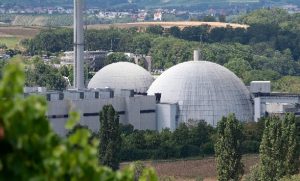16-04-2023
BERLIN: Germany’s final three nuclear power plants close their doors on Saturday, marking the end of the country’s nuclear era that has spanned more than six decades. Nuclear power has long been contentious in Germany.
 There are those who want to end reliance on a technology they view as unsustainable, dangerous and a distraction from speeding up renewable energy but for others, closing down nuclear plants is short-sighted. They see it as turning off the tap on a reliable source of low-carbon energy at a time when drastic cuts to planet-heating pollution are needed.
There are those who want to end reliance on a technology they view as unsustainable, dangerous and a distraction from speeding up renewable energy but for others, closing down nuclear plants is short-sighted. They see it as turning off the tap on a reliable source of low-carbon energy at a time when drastic cuts to planet-heating pollution are needed.
Even as these debates rumble on, and despite last-minute calls to keep the plants online amid an energy crisis, the German government has been steadfast.
“The position of the German government is clear: nuclear power is not green. Nor is it sustainable,” Steffi Lemke, Germany’s Federal Minister for the Environment and Consumer Protection and a Green Party member, told media.
“We are embarking on a new era of energy production,” she said.
The closure of the three plants Emsland, Isar 2 and Neckarwestheim represents the culmination of a plan set in motion more than 20 years ago. But its roots are even older.
In the 1970s, a strong anti-nuclear movement in Germany emerged. Disparate groups came together to protest new power plants, concerned about the risks posed by the technology and, for some, the link to nuclear weapons. The movement gave birth to the Green Party, which is now part of the governing coalition.
 Nuclear accidents fueled the opposition: The partial meltdown of the Three Mile Island nuclear power plant in Pennsylvania in 1979 and the 1986 catastrophe at Chernobyl that created a cloud of radioactive waste which reached parts of Germany.
Nuclear accidents fueled the opposition: The partial meltdown of the Three Mile Island nuclear power plant in Pennsylvania in 1979 and the 1986 catastrophe at Chernobyl that created a cloud of radioactive waste which reached parts of Germany.
In 2000, the German government pledged to phase out nuclear power and start shutting down plants but when a new government came to power in 2009, it seemed briefly as if nuclear would get a reprieve as a bridging technology to help the country move to renewable energy.
In March 2011, an earthquake and tsunami caused three reactors of the Fukushima Daiichi power plant to melt down. For many in Germany, Japan’s worst nuclear disaster was confirmation “that assurances that a nuclear accident of a large scale can’t happen are not credible,” Miranda Schreurs, professor of environment and climate policy at the Technical University of Munich, told media.
Three days later then-Chancellor Angela Merkel, a physicist who was previously pro-nuclear made a speech called it an “inconceivable catastrophe for Japan” and a “turning point” for the world. She announced Germany would accelerate a nuclear phase-out, with older plants shuttered immediately.
Russia’s invasion of Ukraine, however, provided another plot twist.
 Fearful of its energy security without Russian gas, the German government delayed its plan to close the final three plants in December 2022. Some urged a rethink but the government declined, agreeing to keep them running only until April 15.
Fearful of its energy security without Russian gas, the German government delayed its plan to close the final three plants in December 2022. Some urged a rethink but the government declined, agreeing to keep them running only until April 15.
For those in the anti-nuclear movement, it’s a moment of victory.
“It is a great achievement for millions of people who have been protesting nuclear in Germany and worldwide for decades,” Paul-Marie Maniere, a spokesperson for Greenpeace, told media.
For critics of Germany’s policy, however, it’s irrational to turn off a low-carbon source of energy as the impacts of the climate crisis intensify.
“We need to keep existing, safe nuclear reactors operating while simultaneously ramping up renewables as fast as possible,” Leah Stokes, a professor of climate and energy policy at the University of California, Santa Barbara, told media. (Int’l News Desk)
 Pressmediaofindia
Pressmediaofindia




